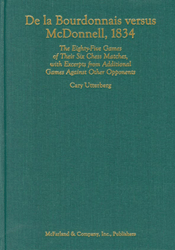De la Bourdonnais versus McDonnell, 1834
My second book (McFarland, 2005) analyzes the first important series of chess games to be recorded and published. Particular attention is paid to the status of opening theory before the matches, and the masters' innovations that influenced future generations. The analytic bulk of three significant opening books (by Philidor, Lewis, and de la Bourdonnais) is reprinted in an appendix. Playing with a modification to Professor Elo's rating system, I conclude with a study of how many rating points of de la Bourdonnais' final edge can be attributed to the opening, middlegame, and endgame.

Publisher's Blurb
When chess masters Louis Charles Mahe de la Bourdonnais and Alexander McDonnell met at London's Westminster Chess Club in 1834, the occasion was notable for a number of reasons. Hard-earned reputations were zealously protected, and masters of equal standing seldom faced each other on even terms. The chess world was watching closely, but it was the actions of bystander William Greenwood Walker, who carefully recorded each move of the 85 games, that would have the greatest impact on the future of chess.
The recording and publication of game scores from a series of matches between masters was a first in chess history. The event irrevocably altered the game, giving birth to modern chess theory. Once based upon composed, abstract exercises, studied in isolation, theory now became concrete and measurable. Practice replaced contrivance, and tactics could be studied and honed in light of the avalanche of match records that followed.
Louis Charles Mahe de la Bourdonnais and Alexander McDonnell played six chess matches in 1834. Biographies of the combatants illuminate their place in the game's history, and their historic venue is examined. The 85 games are analyzed using modern theory; there are numerous diagrams and previously published commentary. The merits of the openings, middle- and endgame maneuvers of the two are weighed. Nine appendices present selected games against other opponents; excerpt a contemporary account of the games' ambience; provide other interesting documents; present statistics; and provide a schematic of mistakes made by both contestants. Bibliography, notes, indexes.
Honorable Mention, Book of the Year Award (Chess Journalists of America)